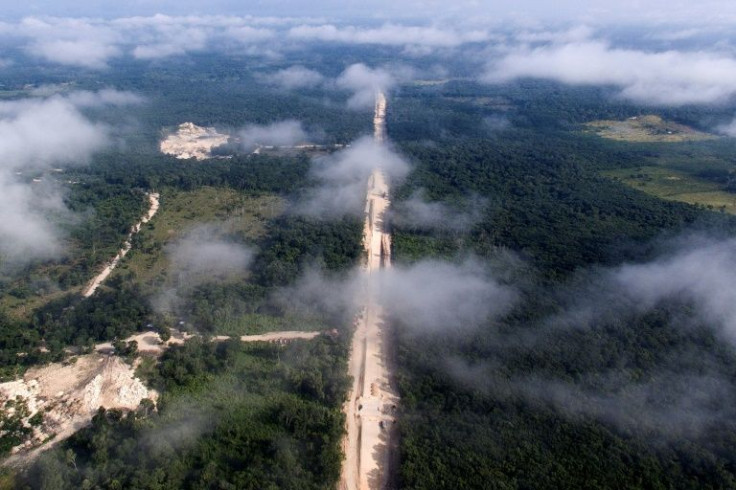Mexico's $15B 'Maya Train' Will Destroy Historical Sites, Rainforest

Mexico continues to build a $15 billion train to run through the Yucatan despite activists and historians saying the train will disrupt pre-Hispanic sites and the local environment.
The Tren Maya railway is the signature infrastructure project of Mexico's President Andres Manuel Lopez Obrador. The President and his administration want the train finished by the end of his term. In May, a judge indefinitely suspended the planned construction on environmental grounds, ruling the train would pose "imminent danger" of causing "irreversible" ecological damage to the area's unique ecosystem.
Archeologists have been working ahead of construction crews to uncover and preserve as many Mayan artifacts and historical remnants as possible. Riviera Maya News reported that over a million archaeological finds had been discovered in excavation efforts to clear the train's path.
During a press conference on Thursday morning, Obrador said one of the most important and positive aspects of the train's construction is the discovery of new Mayan artifacts.
Diego Prieto Hernández, the General Director of the National Institute of Anthropology and History (INAH), said at Thursday's press conference that of millions of discoveries already made, many of them come from housing foundations, bones, vessels and artwork.
"We have information that will nourish the knowledge and study of the Mesoamerican Mayan world for at least the next two decades. In other words, this work will have an impact on the study of the past and present Mayan cultures for many years to come," he said.
The Washington Post interviewed archeologists who the Mexican government employs to locate ruins. Archeologists rank the sites on a scale of one to four, one being marginal importance and four being significant historical value. Archeologists who would spend years, maybe decades, excavating sites need to determine their historical significance immediately after discovery.
Sites with a ranking of less than four will most likely be destroyed to make room for the 950-mile railway through the Mexican rainforest. So far, the government has deconstructed 25,000 historic sites according to an internal government map of the railway obtained by The Washington Post.
According to Obrador, the Tren Maya aims to bring tourists further into the Yucatan and some of the poorest areas of southern Mexico to spur economic development. However, many Mexicans are against the train's construction, with several Mexican senators calling on the United Nations to intervene.
"They're trying to do it overnight," said archaeologist Antonio Benavides to The Washington Post. Benavides oversees the assessment in the state of Campeche. "There's been no planning."
Archeologists are under a tight deadline. Obrador wants the train completed by 2024. The Washington Post reports that government tourism agency officials told archeologists they had 18 days to asses and excavate 37 miles of jungle and that construction would start regardless of completion status. The archeologists said that if they did the work correctly, it would take at minimum two years to assess and excavate the area.
In 2019 Mexico's National Council on Science and Technology released a summary of the Tren Maya environmental risks, stating construction of the train would threaten at least 10 protected natural sites. As a result, activists attempted to halt construction with a legal injunction against the proposed route as an area of the track would cut through rain forest the government did not include in environmental impact statements.
The government cited national security and continued building.
© Copyright IBTimes 2025. All rights reserved.




















